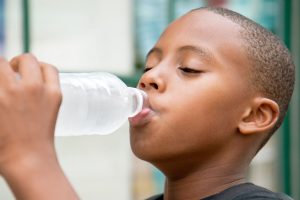 What is dehydration?
Dehydration develops when a body doesn’t have enough fluids. This can be a result of not consuming enough liquids or loosing too many fluids and electrolytes through sickness.
What is dehydration?
Dehydration develops when a body doesn’t have enough fluids. This can be a result of not consuming enough liquids or loosing too many fluids and electrolytes through sickness.
What are the causes of dehydration? There are a variety of factors that can increase your child’s risk of dehydration. These factors include: illness such as vomiting, fever or diarrhea, excessive sweating during sports, existing medical conditions like diabetes or stomach problems or an unhealthy body weight.
What are the signs and symptoms of dehydration? Dehydration can range from mild to severe and have a variety of signs. Symptoms can include dry mouth, refusal to drink, restlessness, extreme fatigue, sunken eyes, crying without the presence of tears, cold or pale feet and hands, along with limited or dark urine.
How is dehydration diagnosed? The aliment can be diagnosed after an exam by your pediatrician. After examining the skin, mouth and tongue and discussing the fluid intake and output, he or she may opt to perform blood and urine tests. The tests will help to determine the electrolyte levels and the cause of dehydration.
How is dehydration treated? There are a number of treatments for dehydration. Babies suffering with the condition should continue to consume breast milk or formula. Older children should not resume eating solid foods until the dehydration has been treated. An ORS, such as Pedialyte, will replace the salt, sugar and minerals that have been lost. It is important to note that sports drinks, fruit juice and soft drinks can all make dehydration worse and should be avoided. Nasogastric tubes and IV liquids may be recommended for severe dehydration.
How do you prevent dehydration? Your child should drink plenty of liquids as directed. On warm days and while participating in sports or exercise they should consume more liquid and do so more frequently. Limiting the time spent outside during the hottest time of day will also help to prevent against dehydration. Keeping track of your child’s urination can help to monitor hydration levels.
When should you seek medical treatment for dehydration? Seek immediate medical attention if your child is experiencing one or more of the following: seizures, green or yellow vomit, confusion, non-responsive behavior, extremely fatigued and difficult to wake, refusing liquids, vomiting after consuming liquids, unable to keep food or drink down, dry lips and mouth, limited urination, or cold and pale feet and hands.
Our compassionate and experienced pediatric urgent care staff are able to help treat the symptoms and discomfort of dehydration. For after-hours pediatric urgent care look no further than NiteOwl Pediatrics.
